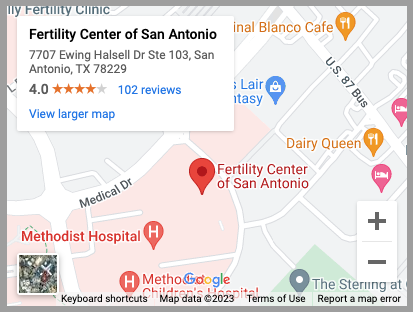Discover your path to parenthood today.
Helping Women Diagnose the Cause of Irregular Periods and Increase Chances of Pregnancy
Irregular periods can make life unpredictable. For women who are trying to become pregnant, an irregular menstrual cycle can make the process very difficult. If you are having eight or fewer periods per year, you may be suffering from oligoovulation. At Fertility Center of San Antonio in San Antonio, TX, our doctors can determine the cause of your condition and recommend the appropriate treatment. Treatment can relieve the downsides of irregular periods and increase your chances of becoming pregnant.
What Is Oligoovulation?
Oligoovulation is a condition that causes irregular or infrequent periods. While women with an average menstrual cycle typically have periods every 28 to 32 days, women experiencing oligoovulation generally have eight or fewer periods each year. Along with anovulation, this is one of the most common causes of infertility for women.
What Are the Causes?
Irregular periods can be caused by:
- Age: Younger women who have recently started their periods and older women who are close to menopause are more likely to experience irregular periods due to hormone fluctuations.
- Weight loss: Significant weight loss can affect the regularity of your periods.
- Stress: Stress and anxiety can affect your hormone balance and the regularity of your periods.
- Hormonal malfunctions: Since your hormones are what controls ovulation, a malfunction or unbalanced release can slow down or stop ovulation from happening.
- Eating disorders: Various types of eating disorders including bulimia nervosa can cause period irregularity.
- Cancer: For some women, endometrial or cervical cancers can cause irregular cycles.
- Ovarian scarring: Scars in the fallopian tubes can prevent eggs from traveling to the uterus, preventing a normal cycle.
The best way to determine the cause is to visit a fertility doctor for an official diagnosis.
How Oligoovulation Affects Fertility
When you are trying to become pregnant, you need to be regularly producing healthy eggs. So for patients who are trying to conceive, oligoovulation can be very problematic.
Fortunately, oligoovulation is treatable in most cases. Our team will recommend a treatment based on your diagnosis.
To address oligoovulation, our team must first determine the cause. To diagnose the reason for your irregular periods, we may perform several tests, including:
- Hormone Testing: Our doctors can perform hormone testing to determine whether hormone treatments are the best way to help you restore a regular menstrual cycle. A hormone test will check the hormones related to fertility such as estrogen, progesterone, androgens, prolactin, and more.
- Blood Testing: To screen for conditions or diseases that may be causing your irregular periods, we may order blood testing.
- Ultrasound Imaging: To determine whether structural or anatomical issues are to blame for your irregular periods, our doctors may also perform ultrasound imaging.
Treatment Options
Fortunately, oligoovulation is treatable in most cases. Our team will recommend a treatment based on your diagnosis.
Ovulation Induction
Ovulation induction is a type of hormone therapy that helps stimulate the development of ovarian follicles that are responsible for releasing eggs during menstrual cycles. Ovulation induction is administered through injections or oral medication. These hormones are identical to the ones that the body produces during a normal cycle. By increasing the amount of eggs that your body produces, this treatment can help increase your chances of becoming pregnant.
Lifestyle Changes
In some cases, simple lifestyle changes like losing weight, committing to a healthy diet, and exercising regularly can help you regulate your menstrual cycle.
Contact Fertility Center of San Antonio
Our doctors can provide the answers you need to increase your chances of growing your family. To schedule a consultation, contact us online or call our team at (210) 692-0577.











